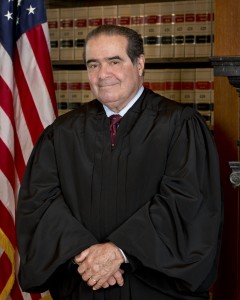Yesterday the nation received sad news. Antonin Scalia, the conservative justice of the Supreme Court, who served our country for some 30 years in that capacity, died in his sleep.
Many things could be said about Justice Scalia. As a law student, who at that time leaned towards a very conservative worldview, I relished in the opinions, especially the dissenting ones, of this colorful justice.
Justice Scalia always stayed grounded in the idea that the constitution should be interpreted according to the plain meaning of the text, just as the founders intended those words to mean at the time they were written. That expansive interpretations that give rise to extra-constitutional rights, such as that of abortion, or gay marriage, were outside of the purview of the court and should be left up to the democratic process.
My worldview has since shifted dramatically from those law school days. I no longer believe that the text of the constitution was intended by the founders to be “suspended in time” and that the only interpretation that can be legitimately given to the words contained therein are the very same ones that the founders themselves would have given to those words.
Yes words do mean things, but often what they mean today is far different from what they meant yesterday. For instance, the word gun, or arm, back in the day of the founders meant, exclusively, the musket, since that was the only available firearm at that point in history. Now, of course, it means a whole lot more…doesn’t it?
Do you catch my drift?
You see, interpreting the constitution in the way Justice Scalia always proposed can lead to severe societal problems. Under his interpretation the constitution would never protect a women’s right to choose, or a homosexual’s right to marry. In addition to such restrictive results, there is also the problem of an expansive interpretation of the word “speech” to allow corporations to exercise it by injecting huge sums of money into political campaigns and thereby undermine the very democracy that Scalia so cherished.
I do admire, however, Justice Scalia’s “groundedness.” It’s good to be grounded. I just believe it’s better to be grounded in a way that has the best potential for positive impact on people and planet. And Justice Scalia’s version of being grounded often did not produce that result. He would say, well, that’s not his fault. He was appointed to uphold “the meaning” that the constitution actually has, not the one he might prefer it to have.
I too like to think of myself as being grounded. Grounded in the idea that what’s most important is not some rigid adherence to text, but a rigid adherence to an idea, or, even better, ideal. And that ideal is that were are all in this together and each of us has a responsibility to manage our impacts for the betterment of people and of planet. This ideal for impact mindfulness can cut across many aspects of one’s existence, including, of course, one’s political views.
We currently have a fellow running for President who tends to hold fast to a similar ideal. His name is Bernie Sanders. I am sure that, like myself, he would hold Justice Scalia’s intellect in great regard, while at the same time vehemently disagreeing with him.
Could the founders really have intended such a result?
The conservative viewpoint seems to be, all too often, that what is correct is to rigidly adhere to ideology, whether it flows from the text of an historic document or ancient book, or the ideas behind a particular ism, even when such rigid adherence no longer serves people and planet.
Yes, it saddens me to hear of the passing of Justice Scalia. However, it does not sadden me to think that perhaps society has a chance to move beyond ideologies that no longer serve us.
Staying grounded is a good thing and Justice Scalia was a shining example of that. But I believe it’s best to be grounded in what’s really good for all of us, especially where the constitution is concerned.
